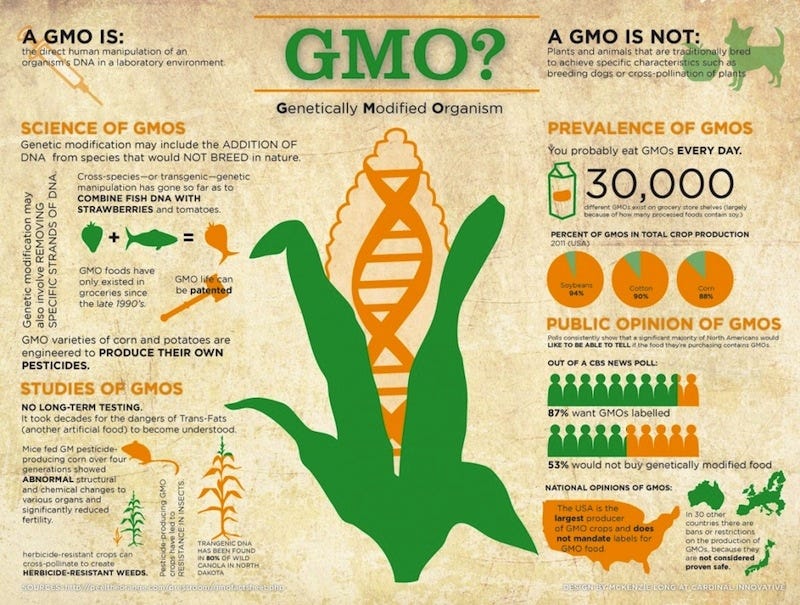
One of the basic definitions of Organic Cotton, as defined by the Organic Trade Organization and the USDA, is that for a product be able to claim that it is 100% organic, it may not contain any GMO'S.

A GMO product is one that has been genetically modified; the term GMO comes from Genetically Modified Organism. The DNA of the organism or crop has been altered in some way to produce an unnatural desired result. Some of these crop modification include altering a plants DNA so that it produces poisons to kill predatory insects, rather than having to spray the crops with these toxic chemicals. GMO products may have their DNA altered to produce larger, longer lasting crop yields, or they may make the final product look more appealing, i.e. tomatoes that are more red or corn that is more yellow. These alterations are made using genetics techniques known as recombinant DNA technology.
Recombinant DNA technology gives the ability to combine DNA molecules from a variety of different sources and combine them into one molecule. That molecule is then spliced back into the DNA of a particular organism in order for it to express a certain desired property.
There are three main groups of GMO's, genetically modified microorganisms (GMM), genetically modified plants (GMP) and genetically modified animals (GMA). This grouping is subdivided even further according to transferability of this modified genetic material. For example, GMP are represented by class 1 – GMP that have limited possibilities of genetic transfer to local crops or that are not a viable strain. Class 2 includes GMPs that easily transfer genetic material, are potential pests, are viable strain or whose genetic transfer can result in negative consequences.

There are many adverse affects that GMO products can potentially have. A few have been listed below:
- Cross pollination to other related crops and wild plants can uncontrollably spread modified genetic material.
- Genetically engineered plants which are designed to kill pests may kill beneficial insects resulting in loss of biodiversity. A recent article published in the journal Nature, showed that bees may become addicted to GM plants when treated with Nicotine-like pesticides. They spend more time feeding from these plants. Futher, evidence showed that bee populations were decreased by half in fields treated with the GM plants.
- Questionable validity of industry data concerning reduced pesticide and/or herbicide use with GM crops as promised.
- Genetic engineering to develop insect resistant crops may encourage the faster development of resistance to pest control products in insect populations, thereby leading to the use of more or stronger pesticides.
- Seed security as seeds are patented so that a farmer can not collect seeds from a gm crop to sow the following season. New seeds need to be purchased.Potential Human Health Impacts
- Because protein sequences are changed with the addition of new genetic material, there is concern that the engineered or modified organism could produce known or unknown allergens.
- Plant genetic engineers have frequently attached genes they are trying to insert to antibiotic resistance genes. This allows them to readily select the plants that acquire the new genes by treating them with the antibiotic. Sometimes these genes remain in the transgenic crop which has lead critics to charge that the antibiotic-resistance genes could spread to pathogens in the body and render antibiotics less effective. See “Risks and Benefits: GM Crops in the Cross Hairs” for more information.
To date, there are no federal laws to specifically regulate genetically-engineered crops. Since 1986, responsibility for GE foods and crops has been divided among three federal agencies, the EPA, the FDA and the USDA.













